Interviewing the individuals recognized each year as Des Moines’ Sages Over 70 is always inspiring for us here at dsm. Their selection is a fitting tribute to their achievements and willingness to share their vision, resources or counsel in support of their community.
We invite you to celebrate this year’s honorees at a Nov. 7 reception where each of our Sages will share brief remarks. The event is 5-7 p.m., with the program starting at 6 p.m., at 320 River Center, a new events venue at 320 W. Martin Luther King Jr. Parkway.
Details, including how to get tickets, are available at dsmMagazine.com. As in previous years, proceeds from the event will benefit the Sages Over 70 Fund at the Community Foundation of Greater Des Moines, our presenting partner. To learn more about the fund and how you can contribute, please visit desmoinesfoundation.org.
When others retire to their leisures, Sages strive for what more can be done as mentors, leaders or philanthropists. We take a lesson from that and trust that you, too, will find inspiration in the following pages, as well as in the video above, created by Duane and Dylan Huey of Good Plan Productions.
Don Blumenthal
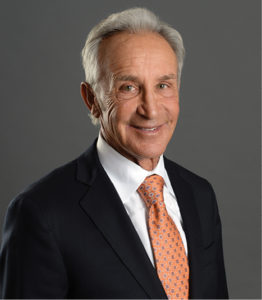 An entrepreneur’s business is like a marriage,” says Don Blumenthal, an expert on both. He has started several wildly successful businesses, and he’s been with his wife, Margo, since they were college sweethearts. Blumenthal, 75, grew up in the business environment of his father’s scrap-iron yard and launched his own company, Steel Warehousing Inc., in 1964 with a powerful team of one, just himself, calling on clients and delivering on orders. The company was a giant in the industry when he sold it in 1995, and then the fun began—a diverse and successful series of businesses that he expanded and sold as an owner or partner.
An entrepreneur’s business is like a marriage,” says Don Blumenthal, an expert on both. He has started several wildly successful businesses, and he’s been with his wife, Margo, since they were college sweethearts. Blumenthal, 75, grew up in the business environment of his father’s scrap-iron yard and launched his own company, Steel Warehousing Inc., in 1964 with a powerful team of one, just himself, calling on clients and delivering on orders. The company was a giant in the industry when he sold it in 1995, and then the fun began—a diverse and successful series of businesses that he expanded and sold as an owner or partner.
As a philanthropic couple, the Blumenthals have supported numerous charities and institutions, including Youth Emergency Services and Shelter, United Way of Central Iowa, Variety—The Children’s Charity, and the Animal Rescue League of Iowa. The Blumenthals have one daughter, Joscelyn, who lives in Colorado.
His Advice
“Be honest and sincere when you talk to your customers. Be fair. They don’t forget.”
“Do the right thing. The money will come if you do.”
“Have an open-door policy with employees.”
“Talk over ideas. Two minds are almost always better than one.”
Make the ask: “You’ve got to door-knock. In business or in fundraising, ask for their business
or for their donations.”
“Remember the community that has made your life possible.”
“Find one or two charities that affect you the most. Then go and work on them so they grow to meet your vision.”
Connect with mentors. Two of his best, he says, were Bill Knapp and the late David Kruidenier. He was initially offended by the advice of Mel Pomerantz, who told him “you can always be better.” But, Blumenthal says, “I realized it’s a challenge to stretch yourself.”
Community Voices
“Don has mentored countless up-and-comers because he genuinely cares about helping others [and] it is difficult to think of a charity that he has not touched, whether financially or through volunteerism.” Suku Radia, CEO and president, Bankers Trust
“Des Moines would not be the same without Don’s community engagement and influence through the decades.” Julie Schneider, chief advancement officer, Youth Emergency Services and Shelter
“Blank Park Zoo is just one of many organizations that have benefited from Don’s support, skills, wisdom, connections and dedication.” Mark Vukovich, CEO, Blank Park Zoo
Among his Achievements
- Founded Steel Warehousing Inc., also was an owner/operator in Shred All, Budget Storage, Laser Resource, Soil-Tek and Concrete Shield.
- A founder and stalwart supporter of Youth Emergency Services and Shelter, where two centers bear the Blumenthal name.
- Primary donor to Blank Park Zoo’s new giraffe building.
- Service as an officer or board member for Bankers Trust, Des Moines Jewish Foundation, Grand View University, Mercy Foundation and March of Dimes, among others.
Joyce Chapman
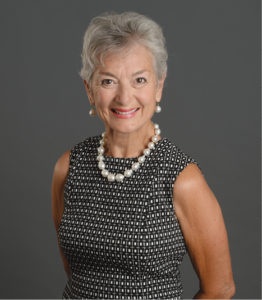 When Joyce Chapman was growing up in Waukee, the sleepy hamlet was home to about 2,500 people and plenty of farm fields. “I knew I wanted more in life than what a small town could offer, and that’s what initially drove me,” Chapman says. That desire led her in 1962 to apply to a bank in Des Moines and the start of a 55-year banking career, including 46 years at West Bank. Throughout the years, she served as a role model and mentor to other women in the industry; today, half of the bank’s officers are women. Chapman, 73, also was instrumental in establishing the bank’s foundation, which provides grants to charitable organizations.
When Joyce Chapman was growing up in Waukee, the sleepy hamlet was home to about 2,500 people and plenty of farm fields. “I knew I wanted more in life than what a small town could offer, and that’s what initially drove me,” Chapman says. That desire led her in 1962 to apply to a bank in Des Moines and the start of a 55-year banking career, including 46 years at West Bank. Throughout the years, she served as a role model and mentor to other women in the industry; today, half of the bank’s officers are women. Chapman, 73, also was instrumental in establishing the bank’s foundation, which provides grants to charitable organizations.
Over the years, Chapman has devoted her time and talent to numerous community organizations, including the West Des Moines Chamber of Commerce, Winefest Des Moines, Jester Park Nature Center, Plymouth Congregational United Church of Christ and the Iowa Culinary Institute. She and her husband, Rick, have one daughter, Christin, and 14-year-old twin grandchildren who live in New York.
Her Advice
“Show up each day to contribute and make a difference.” Approach your work that way, Chapman says, and you’ll be better able to respond to needs as well as recognize and take advantage of opportunities.
Foster teamwork. “No one gets ahead by themselves. … Develop relationships with people who have various types of expertise, and continually expand your horizons to meet new people.”
Stay informed: “Everyone should read the paper every day.”
“Choose your spouse well. … You have to be a good team together and support each other’s goals.” Chapman has been married for 51 years.
Exercise every day. “When I was working full time, I used to run every morning at 5:30. Exercise is the best way to stay healthy and de-stress.”
Send personal, handwritten notes. “It’s important to me that I let people know I’m thinking of them, and emails just don’t cut it. People appreciate when you take a little extra time to write, address and stamp a note. They remember it.”
Community Voices
“Joyce pitches right in to ensure efforts are successful.” Allison Fleming, community volunteer
“Joyce has shown me that the small details make the biggest difference, unique experiences will create long-lasting patrons, and relationships are key to success.” Natasha Sayles, executive director, Des Moines Wine Festival Foundation
“Joyce sees the big picture for our community. She values relationships and private-public partnerships.” Kami Rankin, community relations coordinator, Polk County Conservation
Among Her Achievements
- First female executive vice president of West Bank
- Iowa Women’s Hall of Fame inductee
- First female president of the West Des Moines Chamber of Commerce
- Founding member of United Way of Central Iowa’s Women’s Leadership Connection
- Founding member of the Nexus Executive Women’s Alliance
Jim Cownie
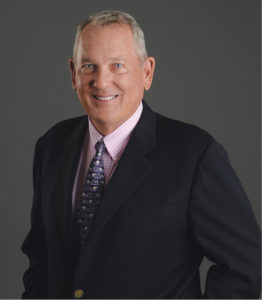 After earning a degree in business administration from Notre Dame, Jim Cownie started looking for business opportunities. He found a dandy at age 26, when he and his friend Jim Hoak created Heritage Communications (later Heritage Cablevision). Heritage eventually became the country’s ninth-largest cable operator, serving 22 states when they sold it in 1987 for $887 million.
After earning a degree in business administration from Notre Dame, Jim Cownie started looking for business opportunities. He found a dandy at age 26, when he and his friend Jim Hoak created Heritage Communications (later Heritage Cablevision). Heritage eventually became the country’s ninth-largest cable operator, serving 22 states when they sold it in 1987 for $887 million.
Cownie, now 73, remained involved in the cable industry into the 1990s, when he turned his interests to real estate development and sharpened his commitment to philanthropy. He credits the influence of developer Bill Knapp: “We both like the action,” he says, “and we like getting things done.” Cownie and his wife, Patty (sweethearts since age 14), have been longtime, prominent supporters of the United Way of Central Iowa and other charities. As philanthropists, their generosity is apparent in the Cownie Sports Complex and the State Fairgrounds’ Patty and Jim Cownie Cultural Center. The Cownies have nine children.
His Advice
“Leave it better than you find it.” That applies to anything you get involved in, he says.
“Do what you say you’re going to do. It’s better to decline an invitation than to fail to deliver. Have the guts to say no, or the resolve to get it done.”
“Recognize your own weaknesses and align yourself with people who have those strengths.”
“Share. Invest in co-workers to motivate results.”
Volunteer. “My favorite person is the volunteer. That’s more important than the money. We can’t have a great city without great volunteers and philanthropists.”
Community Voices
“He has consistently shown a passion and knack for growing our community.” Jay Byers, CEO, and Gene Meyer, president, Greater Des Moines Partnership
“He has been a true believer in the importance of public and private partnerships.” Suku Radia, CEO and president, Bankers Trust
“Jim has always been an example of how to succeed with passion and integrity.” Bill Knapp, Knapp Properties
“Jim has been an outstanding leader and wise counsel to many in Des Moines for over 40 years.” Randy Duncan, attorney, Duncan, Green, Brown & Langeness
Among His Achievements
- Co-founder of Heritage Communications
- Chairman, New Heritage Properties
- Chairman/owner, Westwind Logistics, WWL Holdings, SJC Holdings
- Iowa Business Hall of Fame inductee
- Co-chair of the Des Moines Vision Plan
- Chair of the Des Moines Development Corp. and the Community Foundation of Greater Des Moines
Paul Danforth
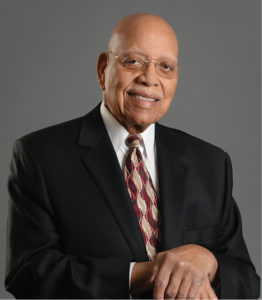 At age 9, Paul Danforth was stricken with rheumatic fever; the recovery process required two years in bed. When he was finally well, doctors told him not to exercise or exert himself. “I did just the opposite,” Danforth, now 87, recalls. “I went outside and rode my bike … and eventually played football.”
At age 9, Paul Danforth was stricken with rheumatic fever; the recovery process required two years in bed. When he was finally well, doctors told him not to exercise or exert himself. “I did just the opposite,” Danforth, now 87, recalls. “I went outside and rode my bike … and eventually played football.”
Danforth has applied that kind of determination throughout his life, overcoming racial discrimination and other barriers to become a longtime leader in clinical social work, an instructor at three universities, a pioneer in fighting segregation, and a trustee at St. Paul AME Church. Danforth and his wife, Doloris, were married for 51 years; she died in 2004. Their daughter, Denice, died when she was 12, and their son, Wendell, and four granddaughters live in Honolulu.
His Advice
Don’t give up. “My parents taught me to find a way around roadblocks. ‘If you can’t find a job,’ they’d tell me, ‘make a job.’ ”
Think positively. When he had rheumatic fever, “my parents stayed positive, even though death was knocking at my door.” For every negative, he says, there is a positive: “When I was sick, I’d slide my bed to the window and watch the kids in the neighborhood play. We’d pretend we were in court, and I’d get to be the judge.”
Know yourself “from the inside out.” Accepting yourself helps you move beyond your limitations.
Take the long view. When you’re facing hardship or you’re discouraged, “realize that this, too, will pass.”
Learn from your mistakes. “As you meet challenges and learn from them, you gain wisdom. I call that the university of life.”
Cultivate gratitude. “I’m known as being ‘magnificently marvelous,’ and I really feel that way. I’ve been blessed.”
Community Voices
“Paul’s goal for the people he serves is for them to have peace of mind and internal joy. He is both astute and erudite and has spent his life’s work tackling the challenges and addressing the needs of our community’s most vulnerable children and families.” Teree Caldwell-Johnson, CEO, Oakridge Neighborhood
“Paul continues to make a difference in the community, uplifting individuals and families as a mentor and life coach, sharing his knowledge, talents, wisdom and treasure.” Mary Chapman, vice president emeritus, Des Moines Area Community College
“He has supported not only his place of worship but other places of worship in the African-American community to promote
a sense of unity in order to bring about positive change.” Rev. Frederick Gaddy, St. Paul AME Church
Among His Achievements
- First African-American to have a private practice office for clinical social work in Des Moines.
- President of the board of the African American History Museum of Iowa.
- President of the Visiting Nurses Association and Services.
- Instructor at Drake and Grand View universities and the University of Iowa.
Jody Reynolds
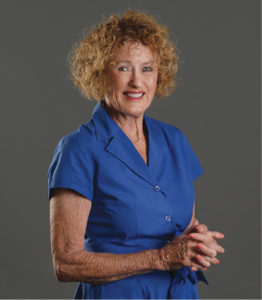 Children have been a lifelong passion for Jody Reynolds. “I was educated to be a teacher, and then when I got married at age 27, we knew we wanted six children,” says Reynolds, a Des Moines native who married Stan Reynolds in 1968. The couple did have the six children they wanted, but tragically, their third child, Brigid, had serious complications at birth that led to her eventual death. “When you have a sick child, you get the true scope of what’s there and not there in terms of services,” Reynolds, now 76, says. “You see the needs that aren’t being met.”
Children have been a lifelong passion for Jody Reynolds. “I was educated to be a teacher, and then when I got married at age 27, we knew we wanted six children,” says Reynolds, a Des Moines native who married Stan Reynolds in 1968. The couple did have the six children they wanted, but tragically, their third child, Brigid, had serious complications at birth that led to her eventual death. “When you have a sick child, you get the true scope of what’s there and not there in terms of services,” Reynolds, now 76, says. “You see the needs that aren’t being met.”
That need helped spur Reynolds’ unwavering devotion to helping children, primarily through her well-known work with Variety—The Children’s Charity. Over the past 43 years, she has helped raise some $109 million for the organization, which serves children who are ill, at-risk or have other special needs. Reynolds also was the first female president of Variety International, a role that took her across the globe to advocate for the world’s most vulnerable citizens.
Her Advice
Know you can do more. In 2003, Reynolds visited a home for severely disabled children in Tasmania. “These kids couldn’t be more handicapped, and I was so moved by the tender loving care they were receiving. The caretakers were so giving. That stands out in my mind, and I remember thinking at the time, ‘I can raise more money. I can always do more.’ ”
Press forward. Being the first female president of Variety International was, at times, “complicated. … Some of the old boys didn’t cotton to it.” But Reynolds didn’t let their resistance slow her down: “I put a smile on my face and pressed forward.”
Make the call. Reynolds notes that there’s always need for volunteers in the community and that getting involved is as easy as calling an organization and offering your help.
Enjoy the journey. Reynolds says she never envisioned where being involved with Variety would take her. “It’s been a wonderful journey raising money and helping others. It’s been a lot of fun.”
Community Voices
“Jody’s passion is to give each child the opportunity to have a better life.” Sherri McMichael, executive director, Variety—The Children’s Charity of Iowa
“Jody has long been a role model for many women to come forward and become a leader.” Rosalie Gallagher, community volunteer and owner of Rosalie Gallagher Designs
“We’ve heard Jody say when she tours the hospital that she always strives to learn something. While her 40-plus years of support are remarkable in and of itself, it is even more telling that she is seeking to understand what needs there are and what role she can play to fill those needs.” David Stark, executive vice president and chief operating officer, UnityPoint Health and Dr. Stephen R. Stephenson, president and chief operating officer, Blank Children’s Hospital
Among Her Achievements
- First female president of Variety Club of Iowa (now Variety—The Children’s Charity of Iowa)
- First female president of Variety International
- Recipient of the YWCA’s Women of Achievement Award
- Worked for the American Red Cross in Vietnam and South Korea
Stephen W. Roberts
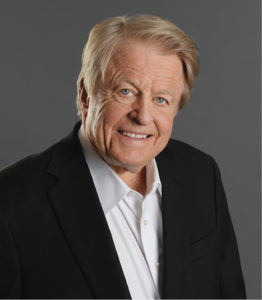 Politics is never far from the mind of Stephen Roberts, 78, a former chairman and national committee member for the Republican Party in Iowa who has been engaged in the political arena since he was a young boy lamenting that Dewy lost to Truman in ’48. Two of his most influential mentors were former Iowa Gov. Robert Ray and former mayor and attorney Arthur Davis. “Giant figures,” says Roberts, a senior shareholder with the Davis Brown law firm. “I learned dedication from both of them.”
Politics is never far from the mind of Stephen Roberts, 78, a former chairman and national committee member for the Republican Party in Iowa who has been engaged in the political arena since he was a young boy lamenting that Dewy lost to Truman in ’48. Two of his most influential mentors were former Iowa Gov. Robert Ray and former mayor and attorney Arthur Davis. “Giant figures,” says Roberts, a senior shareholder with the Davis Brown law firm. “I learned dedication from both of them.”
Roberts takes special pride in having crusaded early for women in his law firm, which added its first five female attorneys in rapid succession. “They were the most qualified,” he says simply. Since then, Davis Brown has been a leader in its efforts for gender equity.
Roberts’ wife of more than 50 years, Dawn, shares his passion for politics. She was a candidate for Iowa secretary of agriculture in 1986. They have three children, who are all engaged in the entertainment industry.
His Advice
“Do what you want to do. There are many worthy professions, so choose what you want to do and commit yourself to it.”
“Give something back to the community. You’ll get more out of it than what you put in.”
“Never give up! The solution for getting through hard times is perseverance.”
“Work hard, take advantage of opportunities and don’t get discouraged.”
“Get involved and change things if you don’t like the way they are.”
Take a pragmatic approach to resolve conflicts, which Roberts describes as “the politics of the possible.”
Community Voices
“I cannot go to a meeting or [make a presentation] without someone in the audience asking if I know Steve Roberts and then proceeding to tell me a story of how much he helped them or assisted their board or charitable foundation.” Jo Ellen Whitney, attorney, Davis Brown.
“I think of Steve as an extremely principled person who always put the good of the organization … ahead of his individual interests.” Gary Streit, former chair of the American Cancer Society national board of directors
“Steve has always offered a civility that is far too rare in the political world.” Scott M. Brennan, attorney, Davis Brown
Among His Achievements
- Former chairman of the state Republican Party and a member of national GOP committees.
- A leader, partner and mentor in the law firm of Davis, Brown, Koehn, Shors and Roberts.
- Board member, volunteer and fundraiser for the Iowa division of the American Cancer Society for more than 40 years.
- Recipient of the Distinguished Eagle Scout award from the Boy Scouts of America.
Retirement Planning for the Soul
Writer: Jann E. Freed
In the 2002 movie “About Schmidt,” Warren Schmidt (Jack Nicholson) is drifting in his life after retirement. He had spent his entire adulthood working without considering what was next. Because he had not prepared emotionally for retirement, his life has little purpose and joy. The movie takes us on Warren’s journey of trying to find himself. The question it raises: If you are what you do and you don’t do it anymore, then who are you?
Many people fantasize about retirement and can’t wait to have the time to do what they want when they want. But often they don’t plan for this phase of life and are unprepared for the changes it brings, such as the loss of title and identity, social connections and structure. While most pre-retirement planning focuses on money, it’s beneficial to spend just as much time and effort planning for how you’ll be emotionally fulfilled.
Society bombards us with advice about anti-aging, but there’s little guidance and encouragement about embracing this phase of life from a mental and emotional standpoint. This requires inner work that involves focusing on ways to stay engaged and to enhance relationships. A critical key is finding a purpose—a reason to get up in the morning.
Most people have a career of 30-plus years, but they often live this many years after their career is over. As life expectancies increase, a new life phase is being created between ages 55 and 85, when demands on time subside and people have more freedom and flexibility. David Corbett, author of “Portfolio Life: The New Path to Work, Purpose, and Passion After 50,” advocates developing a “portfolio mindset” to create a holistic life plan. While careers have a shelf life, portfolios can be timeless.
A portfolio life consists of allocating our most precious assets of time, energy and talents. Corbett identifies five elements to consider when assessing what we are doing with our lives, how we are living and what we value:
- Working or making income.
- Continuing to learn and self-development.
- Relaxing and having fun.
- Connecting with family and friends.
- Giving back through humanitarian or community engagement.
While the elements will not necessarily be equally balanced, the goal is to make intentional decisions rather than drift. Similar to a financial portfolio, regularly reviewing your life portfolio might lead to a reallocation of how and where you spend your time and energy.
Becoming a sage is being intentional about how you choose to use your time and your other resources in ways that matter most to you. Sages have a sense of purpose and look for ways to make a difference. We all age, but a fulfilled later life distinguishes sages from other people.
Leadership guru Jim Kouzes says it best: “The legacy you leave is the life you lead.”
Jann E. Freed, Ph.D., is a leadership development and change management consultant with the Genysys Group and author of the book “Leading With Wisdom: Sage Advice From 100 Experts.” She is certified as a Sage-ing Leader through Sage-ing International (sage-ing.org).










